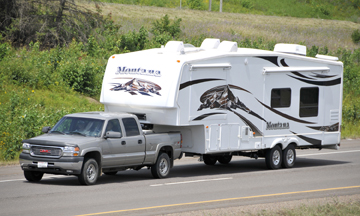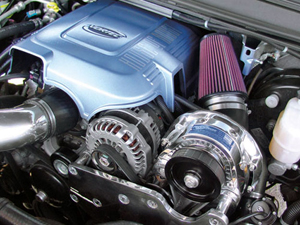Hitches and Towing 101
| CHAPTER CONTENTS | |
| 1. Introduction to Towing | 7. Brake Controls |
| 2. Towing Components | 8. Hitch Installation |
| 3. Types of Hitches | 9. Hooking Up |
| 4. Determining Tow Capacity | 10. Tow Bars/Dinghy Towing |
| 5. Selecting Your Hitch | 11. Towing Safety |
| 6. Wiring/Electrical | 12. Preparing Your Tow Vehicle |
Chapter 12
- Preparing Your Tow
Vehicle
Throughout this series, we've
talked about preparing your vehicle's trailer hitch and wiring, determining
weights and towing capabilities, and how to hook up and tow. The last area to
cover is improvements to your tow vehicle. There are modifications you can make
that can yield more engine power and protect your tow vehicle from the stresses
of towing.
WARNING:
Many of these modifications will void the manufacturer's warranty on a new
vehicle. Many dealer service centers will refuse to work on any vehicle that has
been modified from the factory design in any way. Check your warranty and check
with your dealer before you make any modifications to your tow vehicle.
Before you set out to modify your tow vehicle, you need to understand
that when you make changes to the factory design, you're taking responsibility
for those changes. If you don't do the work to professional standards, you can
damage or even ruin your vehicle. If you doubt your ability to get the work done
right, you should take your tow vehicle to a good service center and ask their
advice and help.
Also, the addition of performance components may give
you more engine power, but you should not exceed your vehicle's factory towing
capacity specifications. Think of these modifications as increasing your
vehicle's margin of safety, not increasing its
capabilities.
Factory Options
Many pickup trucks,
vans, SUVs, and RVs can be purchased with optional "Trailering" and "Camper"
packages. It's always a good idea to purchase these options, because they mean
that the automaker will install heavy-duty parts on your vehicle with a full
factory warranty. Trailering and camper packages generally include an engine oil
cooler, more capable radiator, a more advantageous rear axle ratio, heavy-duty
suspension, and installed trailer wiring. In some cases, a trailer brake
controller is also included.
If you're buying a vehicle specifically for
towing, consider buying a 2WD model. Trucks and SUVs with AWD or 4WD are heavier
and sometimes the transmission/transfer case parts have a lower towing
capability than the comparable 2WD units. If you know that your towing will all
be done on pavement, it's generally better to avoid
4WD.
Aftermarket Performance Upgrades
Some
trailer dealers also offer performance upgrades for tow vehicles. These devices
are not legal in every state or municipality, so check your local laws first to
be sure. If your vehicle is subject to emissions inspection and testing, these
devices can also make your vehicle fail the test. Again, check your local laws
to be sure.  Some
of the most common upgrades available are free-flowing "cat-back" exhaust
systems and fresh air intakes with free-flowing air filters. Installed together,
these parts can increase horsepower and torque by about 10% by opening up
airflow through the engine.
Some
of the most common upgrades available are free-flowing "cat-back" exhaust
systems and fresh air intakes with free-flowing air filters. Installed together,
these parts can increase horsepower and torque by about 10% by opening up
airflow through the engine.
For vehicles made in the last 10 years, you
can also purchase "reflash" or "chip" engine programmers. These change the way
the engine control computer behaves and can deliver more torque and horsepower.
For a tow vehicle, always choose the program that is listed as being safe for
towing. Sometimes these programs reduce your total towing capacity in exchange
for increased performance at lighter loads, so do your research carefully.
Some older automatic transmissions can be retrofitted with "RV" parts
that change shift points and help your vehicle handle heavy loads. These
generally hold each gear longer to keep your engine solidly in its power band
before shifting to a higher gear, and this might feel strange, especially when
you're not towing.
A larger radiator and a set of engine oil and
transmission lubricant coolers can really help with towing. Under increased
stress, your engine and transmission will run hotter, and anything you can do to
keep those temperatures down will help prolong the life of your tow vehicle.
Most manufacturers have a factory option or dealer-installed option for these
parts, and you should use those parts if at all possible.
Another
aftermarket improvement you can make is to add suspension capability. The
commonly-available overload springs and coil spring assists are not worth very
much. It's only a little more expensive, but a lot more effective, to take your
tow vehicle to a reputable spring and suspension shop and have heavy-duty
springs installed. For rear leaf springs, as commonly found on full-size pickup
trucks and vans, the spring shop can install an extra leaf or two and re-arch
the springs. Heavy-duty replacement coil springs for the front suspension are
often available as well.
Be sure that you also outfit your vehicle with
the best possible shock absorbers for trailering. Good shocks keep your vehicle
stable and reduce sway, especially when your trailing rig hits potholes or rough
pavement.
With a bit of work, you can outfit your tow vehicle for
maximum comfort and prolong its working life at the same time.
| << Back to Chapter 11 |




